Writer Joseph J. Airdo
Photography by Carl Schultz
[dropcap]N[/dropcap]ew River resident Arouna Diarra was destined to bring traditional music into the modern-day — further developing it while maintaining its cultural roots.
Originally from West Africa, Arouna performs folk songs that reflect topics from war to love for one another, aspiring to instill joy, harmony and connection within those who hear them.
In addition to singing with spirit, nostalgia and great joy in his native language of Bambara, Arouna also plays the kamale n’goni and the balafon — a 14-string harp-like instrument that is believed to be an ancestor of the banjo and a gourd-resonated xylophone, respectively.
However, music is more than just a hobby for this impossibly cheerful man. One could even say that music is in Arouna’s blood — a family responsibility since birth.
Arouna was born in Bobo-Dioulasso, Burkina Faso, a major hub of cultural and artistic significance in West Africa. His family name, Diarra, is associated with griots — musicians, poets and storytellers who, traditionally, are curators of the arts and history. Seen as leaders, griots serve as advisors to royal personages and are official peacekeepers within their communities.
Arouna’s wife Zaza notes that there are numerous tribes within the Mandingue culture of West Africa.
“In Arouna’s village, there are many tribes doing many different things,” she explains. “Griots are responsible for all communication. And music is a big part of communication. So Arouna’s tribe is a tribe of musicians.”
In fact, Arouna does not recall doing anything else except play music when he was in Africa — and make the instruments with which the music was performed. Therefore, he experienced quite the culture shock upon moving to the United States.
Starting Over from Zero
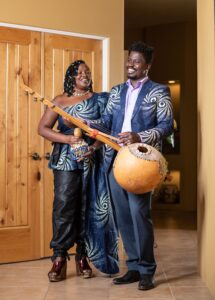


Arriving in Ashville, North Carolina in December of 2012, Arouna recalls being taken aback by the city’s chilly weather. However, adapting to a different climate was nothing compared to integrating himself into a society with which he had absolutely no experience.
“When I first moved here, I did not know where to play,” Arouna explains. “It was very challenging in the beginning. The language was difficult and I had to start my life over from zero. That was not easy but I never gave up.”
One of the strangest things Arouna discovered here in the US was the way in which instruments are tuned. In West Africa, instruments are traditionally tuned by ear rather than with the use of a physical or digital tuner.
“Everything was new,” Arouna adds. “I learned something new every day. I feel like I had been put in school and had to learn 200 new things all at once. At the same time, I had to work at a job that I did not have the experience for. But I had to work because I had a family.”
Arouna worked at Whole Foods for about three years before finally pursuing music full-time in 2015. While playing music on the streets, he made connections that allowed him to create a band.
Formerly a key member of internationally-touring group Lanaya, Arouna became a founding member of the North Carolina-based West African folk music ensemble Mandé Foly. More recently, he has toured the US with Rising Appalachia, performing as part of a diverse group of musicians known as The Ancient Roots Band.
Having moved to Arizona in 2016 because the desert reminded him of his homeland, Arouna discovered that the more he put himself out there, the more success he would find. One day, he brought one of his handmade instruments to a guitar store and asked if he could leave it there to gain some exposure.
Arouna’s initiative paid off. One of the guitar store’s customers contacted a friend who worked at Musical Instrument Museum. This led to Arouna being invited to perform at the museum. He has since been invited back on numerous occasions — to not only perform there but also teach its patrons how to play his homeland’s instruments.
“This makes me very happy,” Arouna says. “I am developing Burkina Faso culture here in America.”
Kamale N’goni
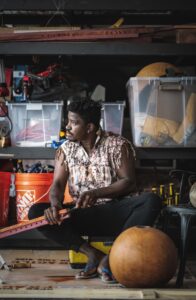


One of the key ways in which Arouna honors and expands exposure to Burkina Faso culture is by making and selling his instruments out of his New River home. Known as a West African harp, the n’goni has existed since at least 1352, when Moroccan traveler Ibn Battuta reported seeing one in the court of Mansa Musa.
The kamale n’goni variety of the instrument that Arouna makes is believed to have been invented by the musician Alata Brulaye in the 1950s and 1960s in the Republic of Mali — a landlocked country in West Africa. The string instrument became popular in the Wassoulou region and contributed to the rise of Wassoulou music during the 1970s and 1990s.
Arouna estimates that he has sold his handmade instruments to more than 200 people since he has moved to the US. Very generous, welcoming and forthcoming, the Diarras even open their New River home to clients who would like to stay for a few days while Arouna teaches them how to play the kamale n’goni.
Others prefer to simply display them in their homes. After all, with gorgeously intricate detailing, these instruments truly are fabulous works of art. In fact, his handmade kamale n’goni are prominently displayed in Musical Instrument Museum’s Experience Gallery as a representation of West African string instruments.
Each kamale n’goni’s foundation lies in a strong neck, typically made from mahogany. Its base is made from a calabash — a strong West African gourd. Goatskin is then shaved, soaked in water and attached to the calabash. Bamboo is cut, dried, filed and used to attach the skin to the gourd. Finally, different weights of fishing line are strung through metal keys to complete the instrument.
Arouna handmakes each and every one of his kamale n’goni according to the traditional West African method. Best of all, due to the extremely high level of their quality, no two instruments are ever alike.
“Every instrument is unique and has a different tuning,” Arouna explains. “That is something that I love about them.”
Arouna also makes and sells traditional West African leather wallets, bronze bracelets and Taureg earrings from the Sahara Desert. Zaza says that her husband’s creations allow him to continue his griot responsibilities here in the US.
“Besides peacekeeping, one of Arouna’s tribe’s responsibilities is to be ambassadors,” she explains. “So it is almost like he has come full circle, getting to be an ambassador wherever he goes.”
The Captain of Smile
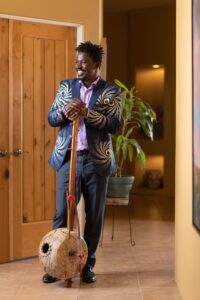


One could not ask for a better ambassador than Arouna, who also teaches his passion and an appreciation for traditional music and instruments to infants, toddlers and preschoolers at Immanuel Care for Children in Phoenix.
Moreover, Arouna has one of the widest and brightest smiles you have likely ever seen — a smile that is continuous and unflinching. And as they say, happiness is contagious.
“My band called me ‘the captain of smile’ because I always made everybody happy by doing something that I do not even know that I am doing,” Arouna says. “When I worked at Whole Foods, my manager always asked me why I was so happy. It is just natural for me. I do not even notice it.”
Arouna may not notice it but he has a fairly good guess as to the reason behind it.
“Music is a big medicine on my life,” Arouna explains. “Sometimes I can be there but my mind is somewhere else thinking about something challenging. As soon as I pick up and start to play my instrument, I will go back to the normal place like nothing ever happened.”

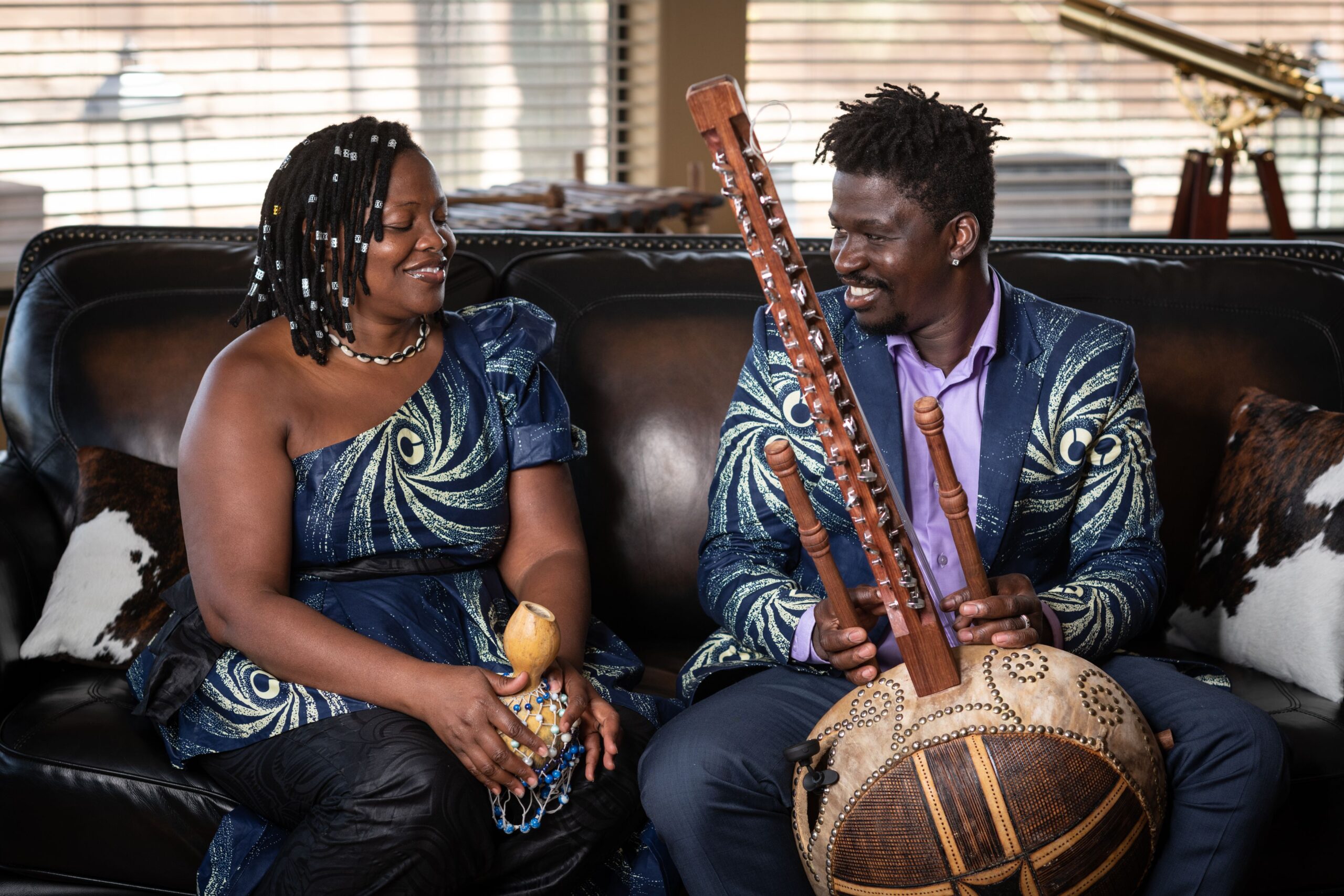


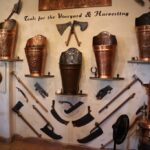
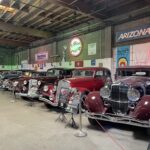

Comments by Admin